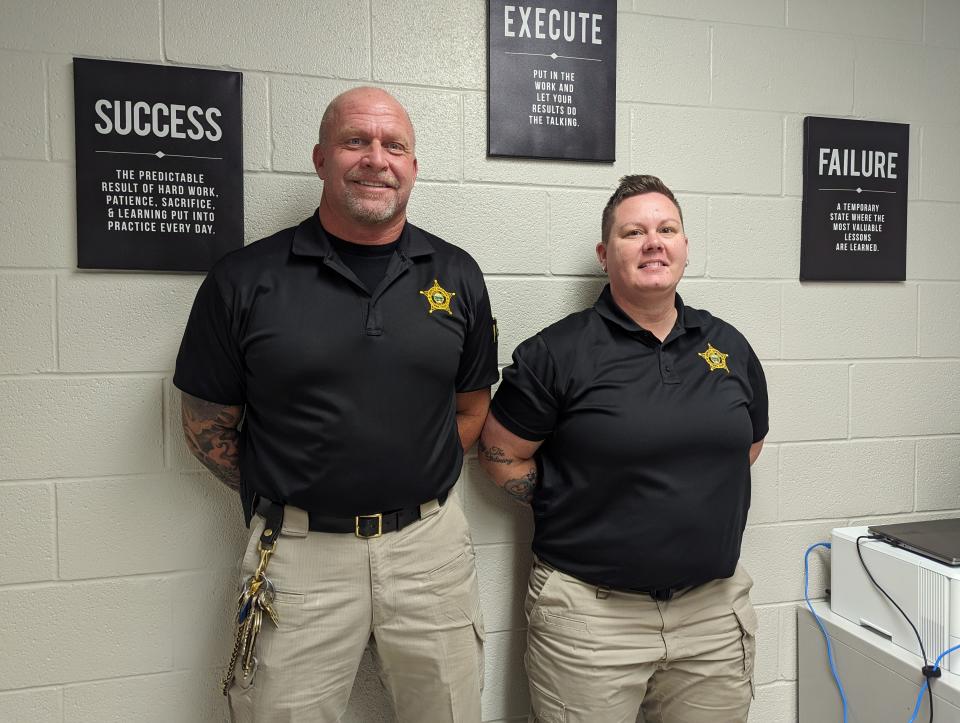Meet Your Neighbor: Tabby Mowel, Ottawa County Detention Center mental health coordinator
PORT CLINTON ― Only a few months into a new job, Tabby Mowel, Ottawa County Detention Center mental health coordinator, is already showing results.
Capt. Mark Green is the administrator of the county detention center, which is in the same building as the Sheriff’s Office.
“The sheriff bringing in Tabby, that is incredible. It has buffered a lot of the inmates' inner turmoil. They can get it out. She meets with them all day long,” Green said. “I’ve noticed a huge difference in the amount of ... neediness, when we are doing our rounds, because it’s already been addressed. She gives them the tools to help them deal with their situation.”
Mowel proactively deals with things to which corrections officers had been reacting.

“An inmate that is dealing with inner turmoil, a lot of times, if they don’t know how to deal with it, it comes out in a negative way, usually against authority, which is us,” Green said. “She provides a mental health safety valve, to help deal with their situation."
Mowel’s reputation precedes her. She was previously a supervisor for Firelands Counseling and Recovery Services, which had the contract for working with the inmates.
“I’m working hand-in-hand with the COs to make sure the inmates are getting the mental health treatment they need. What that looks like is individual mental health counseling, crisis counseling, linking them to outside community agencies for housing, or whatever their needs may be,” Mowel said. “We see results daily. ... When I was here with Firelands, we would be in the jail a lot, as far as resolving a crisis, that’s mental health crises, suicide ideation and behavioral things. I think there has been a fairly big decrease in that because inmates have access to me.”
Even without that word-of-mouth knowledge, passed from inmate to inmate, it’s obvious she is tough, but also there for the inmates. It’s in the way she walks and the unflappable confidence in her smile. She has seen some stuff.
Mowel is an Army veteran with combat experience from two tours in the Middle East. She, the facility correctional officers and her boss recognize that background brings a legitimacy of life beyond any degree earned in a classroom.
Police work, and incarceration, is changing
A large percentage of the public that law enforcement has to work with have mental health issues. Once there is an arrest, the Ottawa County Detention Center is required to work with that individual.
Ottawa County Sheriff Stephen Levorchick recognized the way the facility was working with the individuals was not working, and the situation probably wasn’t going to improve without significant change.
“Approximately eight years ago, we were receiving one hour of mental health treatment, per week, in our correctional facilities. Since then, we have increased it to between 14 and 40 hours per week, but that fluctuated. With grant funding we were able to do that, about six years ago.”
The Sheriff’s Office in 2023 partnered with the Mental Health and Recovery Services Board, which covers Seneca, Ottawa, Sandusky and Wyandot counties.
“We partnered with Director Mircea Handru and they now fund a full-time employee, who is employed by the Sheriff’s Office,” Levorchick said.
The Sheriff’s Office has two facilities, the Detention Center that is located below the Sheriff’s Office and a minimum-security facility located on Buckeye Boulevard. Combined, they house an average of 90 inmates.
Mowel’s first day with the Sheriff’s Office was Oct. 2. She’s a full-time employee, working five days a week, 8 hours per day.
“She takes care of the mental health treatment for inmates at both facilities. We’re pretty proud of the fact that we’re able to provide a guaranteed 40 hours, a week of mental health treatment for the inmates,” Levorchick said.
Mowel’s a believer in consistency, as the inmates know their provider and that leads to more trust. It’s no longer a random contracted outside provider.
“Teamwork makes the dream work,” Mowel likes to remind everyone, on both sides of locked doors.
Full plate with new job
Levorchick noted some failures with the system, stemming from $58 million in cuts to mental health from administrations prior to Gov. Mike DeWine's election.
“With those cuts, correctional facilities, in the state of Ohio, have now become the mental health facilities,” Levorchick said. “We had been tasked with caring for the mentally ill within our correctional facilities, and we never had mental health professionals in our facilities. That’s what we’re trying to do now.

“Governor DeWine has put the lion's share of that back in the budget, something like $30 million per year, that he has put back in, over the course of his administration. Governor DeWine has been very supportive of the treatment of mental health,” Levorchick said.
Green’s soft-spoken demeanor and attention to detail contrast with a wrestler’s build. He commented on time spent on basic care of the mentally ill.
“It’s several hours per day. A lot of times, the more mentally ill lack in hygiene, so we have to encourage them to shower. ... A lot of times they don’t care for themselves as well as someone who is not suffering from mental illness,” Green said.
Green and Levorchick agreed that the facility will average seven more severely mentally ill inmates. Some statistics have shown as much as 90% of the inmates, across the state, deal with mental illness of some form.
“But they take up the majority of our time, during normal operations,” Green said.
Drug problems are also common.
“A lot of times they are self-medicating, and when they come in the jail they can no longer self-medicate. Then they digress,” Green said, as he started talking about the related medical needs of the inmates. “When they come in the jail, they become ‘dopesick,’is the slang for it, the withdrawal from this and that. It’s also a red flag for us to watch them. It keeps our staff vigilant with protocols. It’s a constant concern for their care.”
Sheriff’s deputies are also required to undergo mental health training.
“This is not a mental health facility, but we have to deal with it. If we fail to deal with it, then we fail our community,” Levorchick said. “We also have to remember this is a county jail; it’s not really the hardened criminals. They are part of our community and they will be going back into our community. They are people we shop next to. A lot of people work next to them. They might be people you sit next to in church. They will be back in our community. Part of our job is preparing them for release and to stop the recidivism.”
“Tabby is awesome. She really knows her job, and she’s a great human being,” Levorchick said.
rlapointe@gannett.com
419-332-2674
This article originally appeared on Fremont News-Messenger: Port Clinton OH county jail inmates get enhanced mental health care

